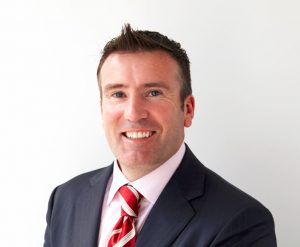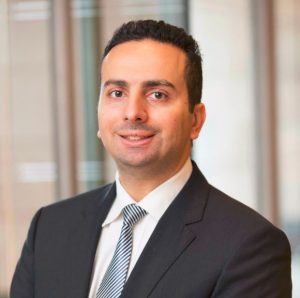Welcome to the latest edition of our Exchange Newsletter.
In this edition, our CEO, Damien Cooper gives insight into how Financial Decisions has continued to service our clients under COVID-19. We formally introduce Anwar Raslan, our new Chief Investment Officer, and delve into the importance of having a Will. And finally, we take a look at some clever strategies to help reduce aged care fees and increase income for older Australians.
Message from Damien Cooper

Damien Cooper, Chief Executive Officer
This year has been unprecedented and challenging with both local and world events – drought, bush fires, and COVID-19 have had its impact on us, our families and our clients since the beginning of 2020. I thank you for your continued clientele and support of Financial Decisions as we work through some of these challenges.
I would also like to assure you that this loyalty goes both ways, and that we will always be focused on doing the right things for our clients.
As part of that commitment, and to ensuring the long term success of the company, we recently formalised the Financial Decisions’ Board. We appointed Craig Tegel as Chair of the Board and we have put in place processes and policies which guide and govern the behaviour and actions of the Board. We continue to develop and mature as a Board, focussing on:
- Ensuring the financial viability and security of the company;
- Ensuring good governance and compliance;
- Determining the strategic direction of the company and executing its plan; and
- Ensuring the company continues to focus on the best client outcomes.
The Board helped develop our COVID work plan to ensure we remain focused on our clients while continuing to work in a new environment.
Staff are back in the office with a team A & B roster and will do so until the government relaxes the social distancing laws. We continue to take all the precautionary measures in our meeting rooms and would encourage and look forward to meeting face to face.
As we come out of the challenges of the last three months I am positive about the opportunities ahead and look forward to steady recovery, all the while conscious of the rough road ahead.
Introducing Anwar Raslan

Anwar Raslan, Chief Investment Officer
We are delighted to formally introduce you to our new Chief Investment Officer, Anwar Raslan.
Anwar joined us in January of this year and has been working closely with Albert Lee in the lead up to Albert’s departure last month. During this time Anwar became familiar with the investment philosophy of Financial Decisions, as designed by Albert, and this will continue to be applied under Anwar’s management.
Anwar has a wealth of knowledge and experience within the finance industry gained over twenty years, coupled with exceptional attention to detail and a drive for providing high levels of success.
Anwar has a deep interest in and passion for investments. He is an avid reader of investment articles and books and regularly attends investment briefings, conferences and events. Anwar also gathers information and ideas by meeting with leading analysts and money managers to broaden his understanding of various investment concepts.
His focus and experience is on portfolio construction, researching investments and making investment recommendations for clients. Anwar’s knowledge extends to Australian and international shares, fixed interest investments, real estate investment trusts and strategies that utilise derivatives.
Anwar is highly credentialled. He is a CFA® Charterholder, Certified Financial Planner and holds a Master in Business Administration, Master in Financial Planning, Graduate Diploma in Applied Finance and Investment and a Bachelor of Economics Degree.
Where there’s a Will there’s a way to protect your assets
As we have recently been spending more and more time at home, many of us are sorting out our life admin – and that includes ensuring our Wills are up to date.
If you don’t yet have a Will, now is the perfect the time to ensure your assets, and children, are protected in the event of your death. And remember, a Will is not just for married couples, or those with children. Anyone over the age of 18 can make a Will, particularly as most people now have a superannuation fund, which may include a large insurance policy.

Preparing your Will can be a complicated and emotional task. It is therefore important that your Will is prepared by an expert who is supported by accountants, taxation, investment and legal professionals.
Why is a Will so important?
A Will is a legal document that clearly sets out your wishes for the distribution of your assets after your death. Having a clear, legally valid and up-do-date Will is the best way to help ensure that your assets are protected and distributed according to your wishes
Studies show that on average 45% of Australians do not have a current Will. If you die without a Will, no-one knows who you wanted as your beneficiaries, or who you wanted as your executor (the person or organisation you nominate to administer your estate upon your death).
Our deaths have a profound impact on our loved ones and with a Will in place conflict between your loved ones can be minimised if not avoided altogether.
Your Will is probably the most important document you will ever sign.
Without a Will, your assets will be distributed according to a set formula with certain relatives receiving a defined percentage of your assets, despite what you may have wished, and if your only living relatives are more distant than cousins, your estate will pass to the government.
Estate Planning
Estate planning is more than just a Will. It involves consideration of complex areas of law including superannuation, trusts, family law and taxation law that need to seamlessly integrate. Some things to note include:
Binding Death Benefit Nomination
- Upon the death of a member, the trustee of the superannuation fund may choose to distribute the deceased member’s superannuation death benefit to:
- one or more of the member’s dependants (e.g. spouse, children); or
- the member’s legal personal representative (i.e. executor of the estate) to distribute under the terms of the Will.
- Rather than leave this decision to the trustee, the member may make a binding death benefit nomination during their lifetime. This nomination will compel the trustee to pay the funds to the beneficiary chosen by the member.
- The member’s choice of beneficiary is often driven by potential tax consequences or the risk of a family provision claim.
Enduring Power of Attorney
- An Enduring Power of Attorney (EPOA) allows you to appoint someone to make financial decisions on your behalf. This is often a spouse, trusted family member or close friend.
- The appointment may be effective immediately (which may be useful for people who travel often) or only when a medical practitioner certifies that you are unable to make decisions for yourself any more.
- An EPOA ceases to have any effect after your death.
- Having an EPOA is as important as having a Will. Without it, no one can make financial decisions for you without applying to the NSW Civil and Administrative Tribunal.
Enduring Guardianship
- Enduring Guardianship allows you to appoint someone to make health, lifestyle and medical treatment decisions on your behalf.
- The appointment is effective when you are unable to make those decisions for yourself anymore.
- Without it, the law sets out who can make health decisions on your behalf, being:
- firstly, your spouse or de facto partner;
- secondly, a person who has care of you; or
- thereafter, a close friend or relative.
Advance Care Directive
- An Advance Care Directive sets out the treatments that you do or do not consent to in certain circumstances.
- It is binding on medical practitioners and overrules an Enduring Guardian. To the extent that an Advance Care Directive is silent on a particular point, then the decisions will fall to your Enduring Guardian.
Trusts
Trusts may be created for a range of reasons such as tax effective estate planning, to provide ongoing support for a beneficiary, or to benefit a charity.
All trusts need careful explanation and proper assessment of their benefits. It is important to match your wishes and your beneficiaries’ needs with the right type of trust. Some examples are:
- Children’s Trusts – These are generally created in Wills and are administered for children until they reach the age of 18 or older as determined by the provisions of the Will. These trusts can be created to take effect if one or both parents die, and can help to provide tax effective income to the children. Funds can be used for the child’s education and living expenses.
- Trusts for adults not able to manage their own finances – These can be created for adults vulnerable to financial loss or financial exploitation.
- Special Disability Trusts – Allows a person to plan for the future care and accommodation needs of a loved one with a severe disability.
We’re here to help
Like to keep things simple? So do we. But relying on a standard Will actually makes things complicated for executors and loved ones. In fact, the very purpose of having a comprehensive, modern and flexible Will is to make things ‘simple’.
Your Will needs to:
- Give executors clear priorities and authorities;
- Give beneficiaries options and flexibility to match their circumstances;
- Provide option to inherit via testamentary trusts;
- Provide opportunities to distribute your estate in the most tax effective way possible;
- Help make Probate as hassle free as possible.
Enjoy your life and let us take care of the details. For help, advice or support in planning your estate, contact us on (02) 9997 4647.
Tips to help reduce aged care fees and increase income for older Australians
The Australian population is ageing, with those aged 65 years and over making up a growing proportion of the total population. What’s more, this proportion is projected to grow over the coming decades.
That’s why as both a nation and as individuals, it’s prudent to look at ways we can help reduce aged care fees, increase the pension and/or provide necessary cash flow for older Australians.

Below are some strategies individuals can adopt to help minimise income and assets for Centrelink’s means testing, increase the age pension, and reduce means tested care fees.
Retaining the home
The family home is exempt from the Centrelink assets test for up to two years where the resident leaves the home to enter a care situation e.g. permanent residential aged care. This exemption may help in retaining the age pension.
Reversing the mortgage
If the home is retained, a reverse mortgage such as the Pension Loan Scheme (PLS) may provide additional cashflow to meet expenses. The PLS is a reverse mortgage offered by the Government that requires Australian real estate as security, and involves a regular fortnightly draw down up to 150% of the person’s maximum age pension.
Paying RAD
The Refundable Accommodation Deposit (RAD) is a Centrelink exempt asset that can help retain or increase social security entitlements (if any), and reduce the means tested amount. While the RAD is an assessable aged care asset, no income is assessed for the income test.
Loan secured against assessable assets
Loans secured against assets assessable for aged care may reduce the value of assessable aged care assets e.g. real property or investments. However, this does not apply to a RAD. This strategy involves formalisation of loan contracts fees, therefore it’s important to consider cost vs benefit, as well as any legal ramifications, before implementing.
Couple living separately and apart
When one partner of a couple enters residential aged care, the couple is treated as illness separated, with each partner attributed 50% of combined assets. The single income and assets means test apply to those treated as living separately and apart.
Financial hardship
A Home Care Package (HCP) or residential aged care recipient or their approved care provider may apply for a financial hardship determination for the recipient.
Special Disability Trust
A Special Disability Trust (SDT) is a trust set up solely to provide for the accommodation and care needs of a disabled person – the principal beneficiary. SDTs have concessional social security and tax treatment, however they’re subject to stricter rules. Immediate family members may donate to the SDT up to a total of $500,000 without deprivation rules applying.
Aged care annuity
The aged care annuity can only be purchased by a person with an ACAT assessment. If the RAD has been fully paid, a cash reserve has been established and there are remaining funds, the aged care annuity may increase Centrelink entitlements and reduce aged care fees.
Click here for the full article: 
Clearly this is a complex matter that requires thorough planning well before firm decisions are made. If you or anyone you know needs more information about an appropriate aged care solution, please don’t hesitate to contact us at Financial Decisions.
Let’s chat
Financial Decisions can help you with wealth management, superannuation, estate planning, mortgages, tax and accounting, and life insurance. To find out more about our services, please contact your adviser or call us on (02) 9997 4647.
Disclaimer: This publication has been compiled by Financial Decisions (AFSL/ACL Number 341678). Past performance is not a reliable indicator of future performance. While every effort has been taken to ensure that the assumptions on which the outlooks given in this publication are based on reasonable data, the outlooks may be based on incorrect assumptions or may not take into account known or unknown risk and uncertainties. Material contained in this publication is an overview or summary only and it should not be considered a comprehensive statement on any matter nor relied upon as such. The information and any advice in this publication do not take into account your personal objectives, financial situation or needs. Therefore you should consider its appropriateness having regard to these factors before acting on it. While the information contained in this publication is based on information obtained from sources believed to be reliable, it has not been independently verified. To the maximum extent permitted by law: (a) no guarantee, representation or warranty is given that any information or advice in this publication is complete, accurate, up-to-date or fit for any purpose; and (b) Financial Decisions nor its employees are in any way liable to you (including for negligence) in respect of any reliance upon such information or advice. June 2020
Contact: Financial Decisions PO Box 484 Mona Vale NSW 1660, T 02 9997 4647, F 02 9997 7407

